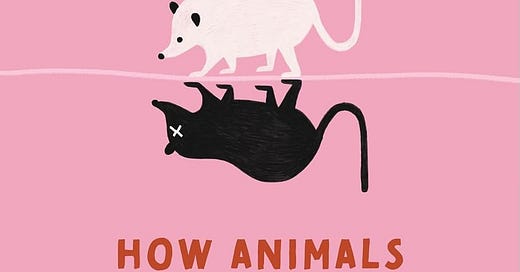Susana Monsó is a Spanish philosophy professor who has written a book, Playing Possum: How Animals Understand Death. It has a bright pink cover and has received an inordinately respectful amount of attention. The subject of Playing Possum is comparative thanatology—a groovy new interdisciplinary field that examines non-human animals’ concept of death and their expressions of grief or confusion in the face of it, the study of the sorrow and bereavement practices being more interesting perhaps than confronting our appalling cruelty and indifference to them. Why, it’s like we’d prefer not to have them around us at all! Except those we want/need/prefer to eat.
Monsó’s book is a pop production—it’s not just the giddy pink cover—grafted onto a prestigious university press. Silly opposites—the anarcho-punk teenager and his Catholic grandmother; Lois Lane and Clark Kent—are set up as parameters of comprehension. Sprinkled throughout are curious asides such as “with respect to the minimal concept of death, this is all for now … I hope you’re still there” and, regarding one primate’s cleverness, “a round of applause, while we’re at it, for this baboon.” It’s a potluck of other papers and studies (some going back to the fifties), scoops of scientific equivocation, doses of classroom definition and instruction:
Grief should not be confused with a concept of death
A good definition of death is non-functionality and irreversibility
Thanatosis is different from toxic immobility
Anthropomorphism is not anthropocentrism;
Keep reading with a 7-day free trial
Subscribe to Book Post to keep reading this post and get 7 days of free access to the full post archives.



